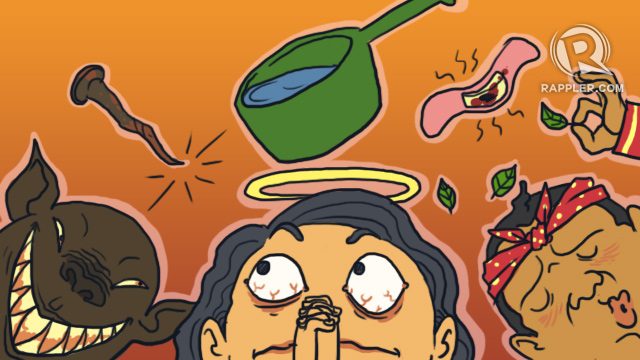SUMMARY
This is AI generated summarization, which may have errors. For context, always refer to the full article.

Editor’s Note: This piece was originally published in April 2015. Rappler is updating and republishing this to mark Holy Week 2018.
MANILA, Philippines (UPDATED) – For those who grew up spending Holy Week in the country, you may have already heard of some old superstitious beliefs associated with this religious occasion.
Yes, even this week-long Catholic event is not spared from folk beliefs that have been part of our consciousness for generations. And even in these modern times, we still hear some of these old Holy Week notions.
Here are just some of the superstitions associated with Holy Week.
Noise
Holy Week is considered to be a solemn time for Catholics to reflect on the passion, death, and resurrection of Jesus Christ. And to preserve this solemnity, an early Filipino belief frowns upon making noise or any unnecessary sound during this time.
Some children – who are actually enjoying their summer break – are even ordered not to watch TV or listen to the radio at this time. Prior to cable television and the internet, it might have been helpful that local TV stations sign offed from their regular programming, especially during Holy Thursday and Good Friday.
Danger
For some people, Holy Week is a time for vacation and travels. But according to superstitious beliefs, traveling at this time may not only result in more frequent accidents – any injuries and wounds sustained during this period are believed to heal slower as well.
This is due to another early belief that evil spirits gain strength during Holy Week, mainly due to Christ’s passion and death. Beliefs put emphasis on Good Friday, as it is when aswangs (local mythical man-eating creatures) are said to be at their strongest.
But on a good note, Good Friday is also said to make albularyos (witch doctors) and faith healers become more effective and powerful. It is also a day when anting-antings or agimats (amulets or charms) work best.
In the absence of an amulet, beliefs point to the palaspas (palm leaves) blessed on Palm Sunday as an effective charm. The palaspas should be placed on the door of homes to ward off evil and bad luck. It is said to help cure ailments when mixed with coconut oil.
Longer time for wounds to heal
Some believe that wounds take a longer time to heal on Good Friday.
A cultural anthropologist explained in a March 2018 episode of Ang Pinaka of GMA Public Affairs that this belief is patterned after Jesus Christ’s suffering from his crucifixion on the same day. As it took three days before Christ’s resurrection on Easter Sunday, wounds acquired on Good Friday also don’t heal as easily.
A sociologist explained that this belief might have been prompted by the desire to make children behave during Holy Week. Because the faithful ought to be in a contemplative mood, children are discouraged by their parents from engaging in physical activity during this week
Children
Early beliefs give more instructions for children to follow on Black Saturday.
In the morning of this day, children are advised to jump high before the church bells ring to help them grow taller – similar to the belief during New Year’s Eve celebration.
In the evening, they are advised to eat meat at 10 pm to keep them from going deaf.
Water
Depending on certain days on the Holy Week, water could signify either something good or bad.
On the one hand, superstitions disallow baths or even laundry at 3 pm of Good Friday, considered the hour of Jesus Christ’s death. Anyone who disobeys this belief is said to be befallen by evil.
On the other hand, being wet on Easter Sunday is considered holy. Superstitions say that rainfall on this day is holy water, and may have healing powers.
Superstition per place
Mount Banahaw: This volcano complex located between Laguna and Quezon is popular among pilgrims. It is considered a holy mountain, and is even believed to be the “New Jerusalem.” Pilgrims bathe in its waterfalls for its alleged healing powers.
Oriental Mindoro: In the town of Bulalacao, circumcision is preferably done on Black Saturday. According to the town’s belief, being circumcised on this day can make the process “less bloody” than when done on a Good Friday.
Holy Week message
The Holy Week observance in the Philippines, just like any others in the country, has indeed combined the religious faith with folk and even pagan beliefs.
So why have these superstitions on Holy Week? An episode of ABS-CBN’s Matanglawin explained that most of these superstitions are geared toward children. Most of these beliefs are meant to scare kids, or make them behave.
In a news report, Monsignor Pedro Quitorio III of the Catholic Bishops’ Conference of the Philippines (CBCP) reminded the public not to focus too much on these superstitions during Holy Week.
“A person becomes a fool if his being a Christian is reduced to becoming superstitious. Our concentration should be on the gospel about the Passion of Christ,” he said. – Rappler.com
SOURCES: definitelyfilipino.com, clix.com.ph, australianfilipina.com, various news websites
Add a comment
How does this make you feel?
There are no comments yet. Add your comment to start the conversation.